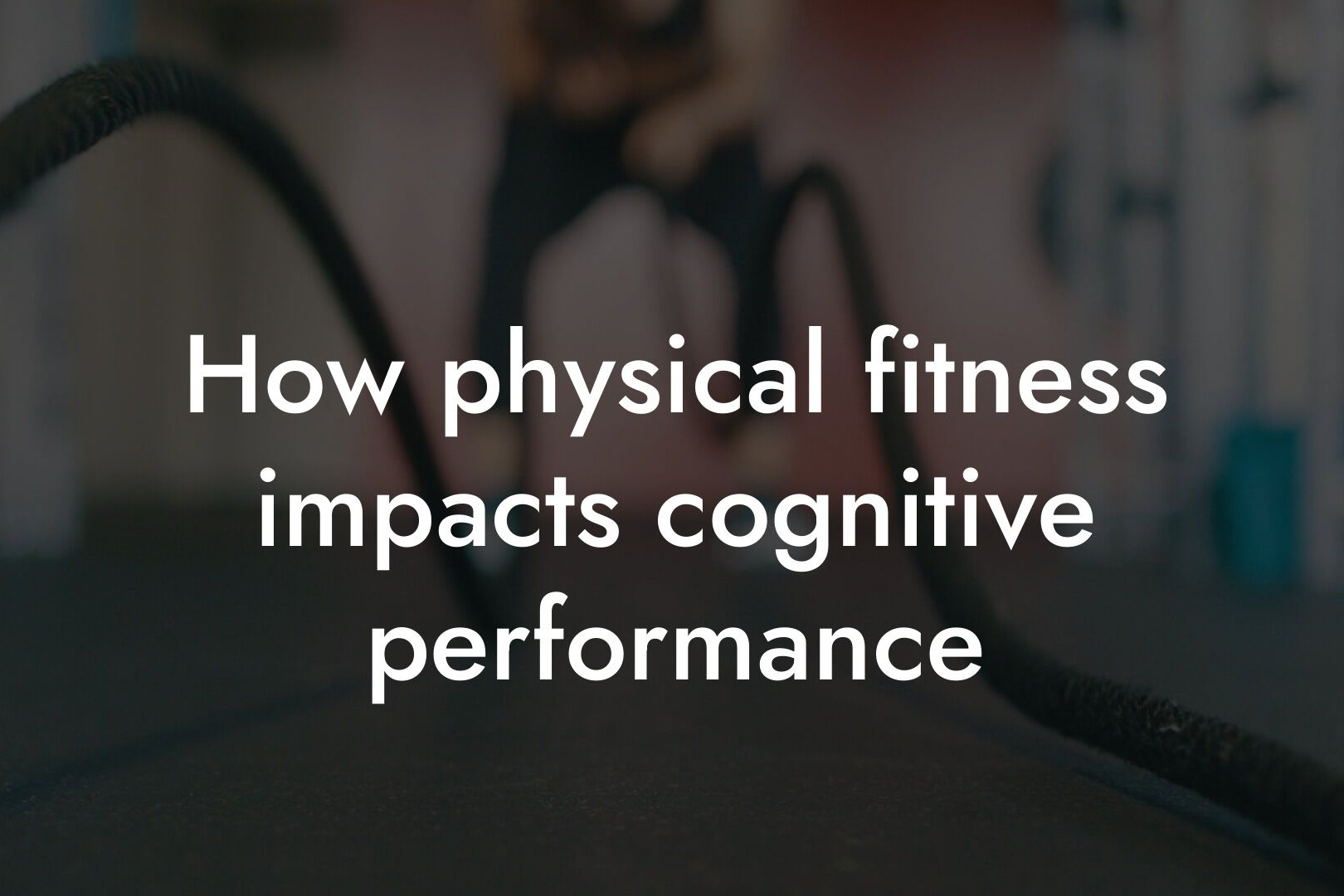As high-earning professionals, you understand the importance of being at the top of your game. Your physical appearance, body fat, physique, and bone density are all crucial aspects of your overall well-being, and they have a direct impact on your mental clarity and performance. At Tano Performance Group, we believe that achieving optimal physical health is the key to unlocking peak mental performance. In this article, we'll delve into the intricate connection between physical health and mental clarity, and provide you with the information you need to take your business to the next level.
Table of Contents
- The Science Behind the Connection
- The Impact of Physical Health on Cognitive Function
- The Role of Nutrition in Mental Clarity
- The Importance of Sleep and Recovery
- The Impact of Body Composition on Mental Clarity
- The Connection Between Bone Density and Cognitive Function
- Practical Strategies for Optimizing Physical Health and Mental Clarity
- Frequently Asked Questions
The Science Behind the Connection
Research has consistently shown that there is a strong correlation between physical health and mental performance. When your body is healthy, your brain functions more efficiently, and you're better equipped to handle the demands of your profession. This is because physical exercise and a balanced diet stimulate the production of neurotransmitters such as dopamine, serotonin, and endorphins, which are essential for focus, motivation, and mood regulation.
Conversely, a sedentary lifestyle and poor nutrition can lead to decreased cognitive function, memory impairment, and an increased risk of depression and anxiety. This is why it's essential to prioritize your physical health if you want to achieve peak mental performance.
The Impact of Physical Health on Cognitive Function
Physical health has a profound impact on cognitive function, including attention, memory, and processing speed. Regular exercise has been shown to improve blood flow to the brain, boost the growth of new neurons, and enhance the connection between different brain regions. This can lead to improved focus, concentration, and decision-making abilities, all of which are critical for success in the business world.
In addition, physical activity has been shown to reduce the risk of age-related cognitive decline and neurodegenerative diseases such as Alzheimer's and Parkinson's. This means that investing in your physical health today can have long-term benefits for your mental clarity and overall well-being.
The Role of Nutrition in Mental Clarity
Nutrition plays a critical role in maintaining optimal mental performance. A diet rich in whole foods, fruits, vegetables, and healthy fats provides the brain with the necessary fuel to function at its best. Conversely, a diet high in processed foods, sugar, and unhealthy fats can lead to inflammation, oxidative stress, and decreased cognitive function.
Specific nutrients such as omega-3 fatty acids, vitamin D, and magnesium are particularly important for brain health, and deficiencies in these nutrients have been linked to impaired cognitive function and mood disorders. By prioritizing a balanced diet and staying hydrated, you can optimize your mental clarity and performance.
The Importance of Sleep and Recovery
Sleep and recovery are often overlooked but are critical components of physical health and mental clarity. During sleep, your body repairs and regenerates damaged cells, builds bone and muscle, and consolidates memories. Without adequate sleep, you may experience decreased cognitive function, mood disturbances, and impaired decision-making abilities.
Recovery is also essential for physical health and mental clarity. Engaging in activities such as meditation, yoga, and deep breathing can help reduce stress and anxiety, improve mood, and enhance cognitive function. By prioritizing sleep and recovery, you can optimize your physical health and mental performance.
The Impact of Body Composition on Mental Clarity
Body composition, including body fat percentage, muscle mass, and bone density, has a significant impact on mental clarity and performance. Excess body fat, particularly in the abdominal region, has been linked to increased inflammation, oxidative stress, and decreased cognitive function.
On the other hand, maintaining a healthy body composition through regular exercise and a balanced diet can improve insulin sensitivity, reduce inflammation, and enhance cognitive function. By tracking your body composition using tools such as DEXA scans, you can gain valuable insights into your physical health and make data-driven decisions to optimize your mental clarity and performance.
The Connection Between Bone Density and Cognitive Function
Bone density is often overlooked but is a critical component of overall health and mental clarity. Research has shown that there is a strong correlation between bone density and cognitive function, with individuals with lower bone density experiencing decreased cognitive performance and an increased risk of dementia.
This is because bone density is closely linked to overall health, including cardiovascular health, inflammation, and oxidative stress. By prioritizing bone health through regular exercise, a balanced diet, and adequate calcium and vitamin D intake, you can optimize your cognitive function and reduce the risk of age-related cognitive decline.
Practical Strategies for Optimizing Physical Health and Mental Clarity
So, what can you do to optimize your physical health and mental clarity? Here are some practical strategies to get you started:
1. Prioritize regular exercise, including cardio, strength training, and high-intensity interval training (HIIT).
2. Focus on a balanced diet rich in whole foods, fruits, vegetables, and healthy fats.
3. Stay hydrated by drinking plenty of water throughout the day.
4. Prioritize sleep and recovery, aiming for 7-9 hours of sleep per night and engaging in activities such as meditation and deep breathing.
5. Track your body composition using tools such as DEXA scans and make data-driven decisions to optimize your physical health and mental clarity.
6. Prioritize bone health through regular exercise, a balanced diet, and adequate calcium and vitamin D intake.
7. Manage stress and anxiety through activities such as yoga, meditation, and deep breathing.
8. Stay connected with your body and mind through regular self-care and mindfulness practices.
In conclusion, the connection between physical health and mental clarity is complex and multifaceted. By prioritizing your physical health, including your body composition, bone density, and overall well-being, you can optimize your mental clarity and performance. At Tano Performance Group, we're committed to helping high-earning professionals like you achieve peak performance through our comprehensive DEXA scans and personalized coaching. Take the first step towards unlocking your full potential today.
Frequently Asked Questions
What is the connection between physical health and mental clarity?
The connection between physical health and mental clarity is a complex and bidirectional relationship. Research has shown that regular exercise, healthy nutrition, and adequate sleep can improve cognitive function, memory, and mood, while poor physical health can negatively impact mental well-being. Conversely, mental health issues such as anxiety and depression can also affect physical health, leading to a vicious cycle.
How does exercise impact mental clarity?
Exercise has been shown to improve mental clarity by increasing blood flow to the brain, promoting the growth of new neurons, and enhancing the connection between brain cells. Regular physical activity has also been linked to reduced symptoms of anxiety and depression, improved mood, and enhanced cognitive function.
What are some examples of exercises that can improve mental clarity?
Examples of exercises that can improve mental clarity include aerobic exercises such as running, swimming, and cycling, as well as strength training, high-intensity interval training (HIIT), and yoga. Even simple activities like walking or stretching can have a positive impact on mental well-being.
How does nutrition impact mental clarity?
Nutrition plays a critical role in mental clarity, with a diet rich in whole foods, fruits, vegetables, and omega-3 fatty acids supporting brain health. A diet high in processed foods, sugar, and unhealthy fats can have a negative impact on mental well-being, leading to inflammation, oxidative stress, and impaired cognitive function.
What are some key nutrients for mental clarity?
Key nutrients for mental clarity include omega-3 fatty acids, vitamin D, magnesium, and B vitamins. These nutrients play a critical role in neurotransmitter function, synaptic plasticity, and neuronal health, and deficiencies have been linked to mental health issues such as depression and anxiety.
How does sleep impact mental clarity?
Sleep is essential for mental clarity, with research showing that adequate sleep is critical for memory consolidation, learning, and cognitive function. During sleep, the brain clears out toxins, processes emotions, and consolidates memories, making it an essential component of mental well-being.
What are some tips for improving sleep quality?
Tips for improving sleep quality include establishing a consistent sleep schedule, creating a relaxing bedtime routine, avoiding screens and stimulating activities before bedtime, and creating a sleep-conducive environment. It's also important to avoid caffeine, nicotine, and alcohol, which can disrupt sleep patterns.
How does stress impact mental clarity?
Chronic stress can have a negative impact on mental clarity, leading to impaired cognitive function, memory loss, and mood disturbances. Stress can also lead to inflammation, oxidative stress, and neuronal damage, making it an important factor to manage for optimal mental well-being.
What are some strategies for managing stress?
Strategies for managing stress include mindfulness meditation, deep breathing exercises, yoga, and journaling. It's also important to prioritize self-care, set realistic goals, and take regular breaks to reduce feelings of overwhelm and burnout.
How does mental clarity impact physical health?
Mental clarity can have a positive impact on physical health, with research showing that individuals with high mental clarity are more likely to engage in healthy behaviors, make informed health decisions, and have better overall health outcomes.
What are some common mental health issues that can impact physical health?
How can I improve my mental clarity?
Improving mental clarity requires a holistic approach that incorporates regular exercise, healthy nutrition, adequate sleep, and stress management. It's also important to prioritize self-care, engage in activities that bring joy and fulfillment, and seek support from friends, family, or a mental health professional when needed.
What are some common barriers to improving mental clarity?
How can I prioritize self-care for improved mental clarity?
Prioritizing self-care for improved mental clarity involves making time for activities that bring joy and fulfillment, such as hobbies, spending time with loved ones, or engaging in relaxation techniques. It's also important to set realistic goals, prioritize rest and recovery, and seek support when needed.
What is the role of mindfulness in improving mental clarity?
Mindfulness plays a critical role in improving mental clarity by increasing self-awareness, reducing stress and anxiety, and improving focus and concentration. Mindfulness practices such as meditation and deep breathing can also improve emotional regulation and overall mental well-being.
How can I incorporate mindfulness into my daily routine?
Incorporating mindfulness into daily routine involves setting aside time for mindfulness practices, such as meditation or deep breathing, and incorporating mindfulness into daily activities, such as eating or walking. It's also important to prioritize self-awareness and self-reflection in order to cultivate a greater sense of mindfulness.
What are some common myths about mental clarity?
How can I maintain motivation to improve my mental clarity?
Maintaining motivation to improve mental clarity involves setting realistic goals, tracking progress, and celebrating small victories. It's also important to find accountability and support from friends, family, or a mental health professional, and to prioritize self-care and self-compassion.
What are some resources for improving mental clarity?
Resources for improving mental clarity include online articles, books, and courses, as well as mental health professionals, fitness trainers, and nutritionists. It's also important to prioritize self-care and seek support from friends and family.
How can I measure my progress towards improved mental clarity?
Measuring progress towards improved mental clarity involves tracking changes in mood, energy levels, and cognitive function, as well as monitoring sleep quality, exercise habits, and nutrition. It's also important to prioritize self-reflection and self-awareness in order to identify areas for improvement.
What are some common mistakes people make when trying to improve their mental clarity?
How can I make lasting changes to improve my mental clarity?
Making lasting changes to improve mental clarity involves setting realistic goals, prioritizing self-care, and making gradual changes to habits and behaviors. It's also important to prioritize accountability, seek support, and celebrate small victories along the way.
What is the role of community in improving mental clarity?
The role of community in improving mental clarity is critical, as social support from friends, family, and like-minded individuals can provide motivation, accountability, and a sense of belonging. Joining a community or finding a workout buddy can also help to increase motivation and adherence to healthy habits.
How can I find a community to support my mental clarity goals?
Finding a community to support mental clarity goals involves seeking out like-minded individuals through online forums, social media groups, or local fitness classes. It's also important to prioritize building relationships with friends and family, and to seek out professional support from mental health professionals or fitness trainers.
Here are some related articles you might love...
- How to balance work, fitness, and personal life
- Meditation and mindfulness for mental resilience
- How physical fitness impacts cognitive performance
- Stress management techniques for busy professionals
- The impact of physical appearance on self-esteem
- Overcoming body dysmorphia
- Goal setting for physical and mental well-being
- How to stay motivated during your fitness journey
- The role of exercise in preventing burnout
Zak Faulkner
Zak Faulkner is a leading authority in the realm of physical health and body composition analysis, with over 15 years of experience helping professionals optimise their fitness and well-being. As one the experts behind Tano Performance Group, Zak has dedicated his career to providing in-depth, science-backed insights that empower clients to elevate their physical performance and overall health.
With extensive knowledge of DEXA technology, Zak specializes in delivering comprehensive body assessments that offer precise data on body fat, muscle mass, bone density, and overall physique. His expertise enables individuals to make informed decisions and achieve their fitness goals with accuracy and confidence. Zak’s approach is rooted in a deep understanding of human physiology, combined with a passion for helping clients unlock their full potential through personalised strategies.
Over the years, Zak has earned a reputation for his commitment to excellence, precision, and client-focused service. His guidance is trusted by top professionals who demand the best when it comes to their health. Whether advising on fitness programs, nutritional strategies, or long-term wellness plans, Zak Faulkner’s insights are a valuable resource for anyone serious about taking their health and fitness to the next level.
At Tano Performance Group, Zak continues to lead our Content Team revolutionising how professionals approach their physical health, offering unparalleled expertise that drives real results.




